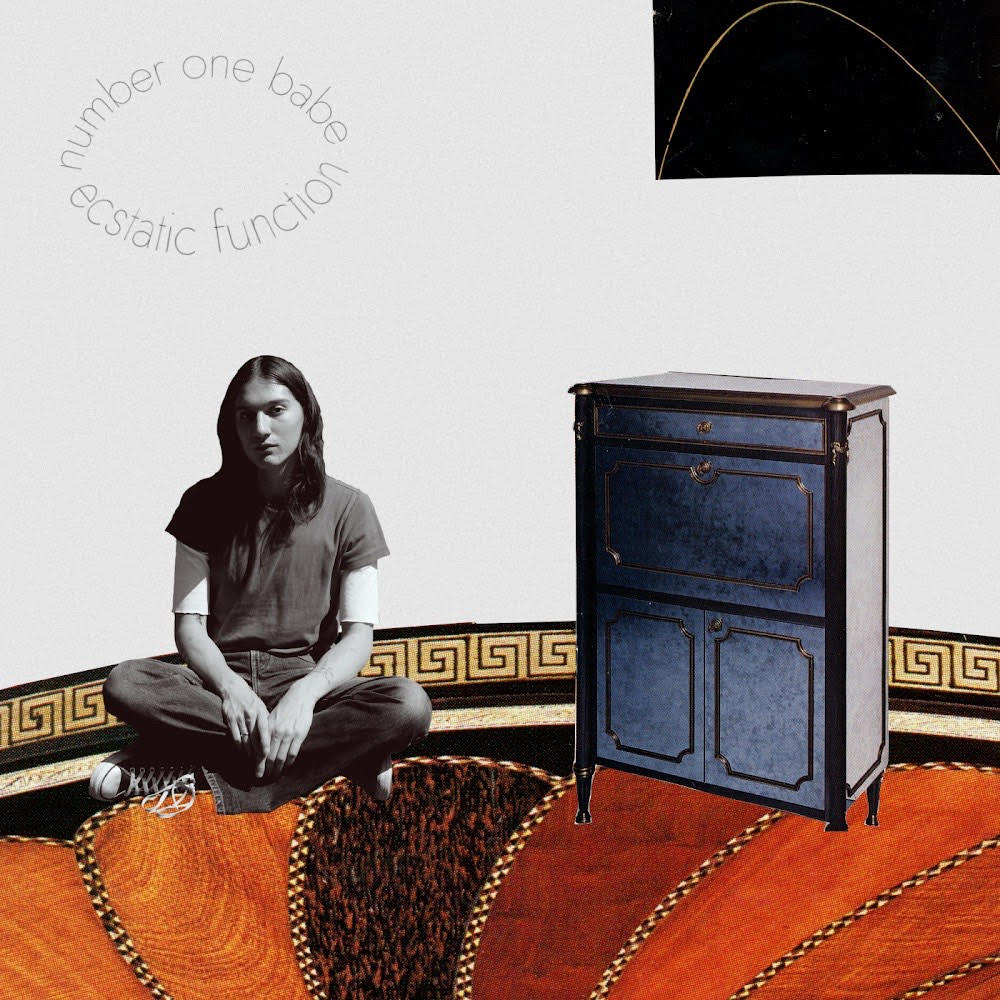
Ecstatic Function cover by Will Jeffries
by Ben Bonadies
I first became aware of Number One Babe at a solo opening set at The Jungle. Alone on the stage, singer/songwriter Alex Cholewa’s delicate voice and reverbed guitar were a world unto themselves. Now with a full band behind them and a cache of new songs in tow, the project (which takes its name from an Adventure Time gag) sounds richer than ever. Their debut LP Ecstatic Function, released today, is a paean to the folk songwriting and production tradition a la predecessors John Prine and Townes Van Zandt.
Allston Pudding talked with Cholewa on the eve of Ecstatic Function’s release about the inspiration behind the album, their experience at Berklee, and running up on the iconic Big Pink in upstate New York.
This conversation has been edited and condensed for clarity.
Allston Pudding: What was the recording process like?
Alex Cholewa: I recorded everything at my house, except for the drums. I was living in Allston at the time on Ashford Terrace. It’s actually a pretty famed apartment. I think a lot of bands have gone through there. I was living there for a year and everything got recorded at that house, and then I moved to Providence.
AP: So are you more affiliated with Providence?
AC: Yeah, I grew up in Rhode Island so I consider myself a Rhode Islander. But I really like Boston a lot. I made a lot of cool friends there so I still go up a lot.
AP: I see you play shows in Connecticut a lot, too.
AC: Yeah I have ties down there. A lot of my family is from the Mohegan reservation in Connecticut. We’re all Mohegan. I grew up in Rhode Island but when I was in high school I moved to Connecticut for a few years and then in 2020 I moved out of Connecticut and went all over the place but ended up in Boston in 2021 into 2022. It was kind of a hectic time for everything, trying to find a stable place to stay, but Boston ended up being that because I started going to Berklee.
AP: I grew up in Connecticut and what people might not realize is that it’s way more rural than you think. I think a lot of America is like that. There’s a little bit of country everywhere.
AC: That’s true, especially in New York, too. A lot of people think of just the city but New York is an entire state that’s just woods. I was up in upstate New York for the first time this year and it was so awesome. We were on a little road trip and I was like, “If we’re here we need to go to Big Pink. I don’t care if somebody lives there, we’ve got to just pull up.” I think it’s an AirBnB, which is crazy. It’s a really long driveway with like three “No Trespassing” signs and I was like, “Let’s just go,” and we got there and nobody was there. We ended up just being able to chill for like five minutes and get some pictures and look at Big Pink. It was pretty cool.
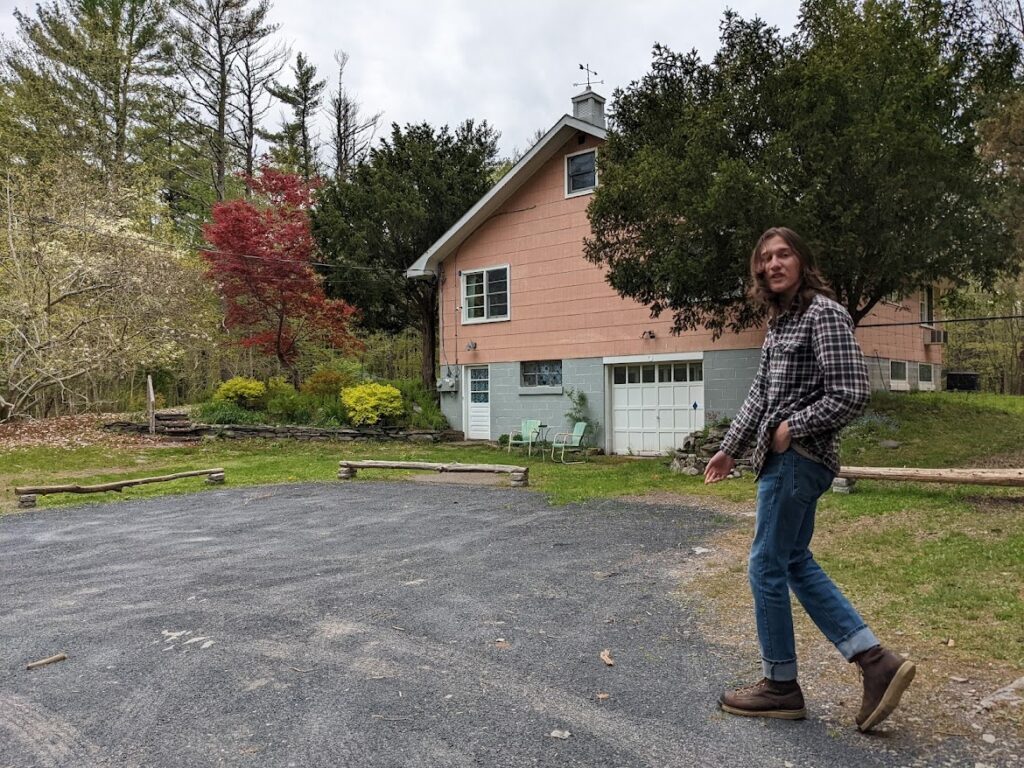
Number One Babe at Big Pink (photo courtesy of Alex Cholewa)
AP: These songs are definitely part of a rich folk tradition, both in the music and the lyrics. There are definitely themes in here about being transitory that are present throughout the history of folk music.
AC: I was riding the train a lot! [Laughs] I think the songs came from a time when I was doing a lot of traveling. I had to move from New York back home to the res and then I had to get off the res cause it sucks there and go back to my hometown. And I feel like subconsciously I had to get rid of those things I had built up. There‘s a lot of talk about home. It’s odd, I think, because home has been up in the air for me for a few years now because I keep chameleoning my way from city to city. Moving to Providence was a conscious effort to find a place to feel like I was coming back home and also continue this music thing. If you’re from Rhode Island you’re from all of it. Anywhere in Rhode Island you can call home, it’s so small. I think my shaky sense of home was a huge inspiration for a lot of the tracks. Boston felt like a place where I could start over in a way and reimagine what any of this meant. Number One Babe had been in a drought up until the point I moved to Boston. I wasn’t really sure where I was going to go with it. Boston was really the catalyst to finally write a lot more and record it, too.
I didn’t have a car, either, for a lot of the time I was living in Boston so I was constantly taking the train. So a lot of the songs feel like train songs. The transitory vibe is definitely huge on the record. It’s definitely not lost on me, I was definitely feeling transitory and not sure where I was going to be during that writing process.
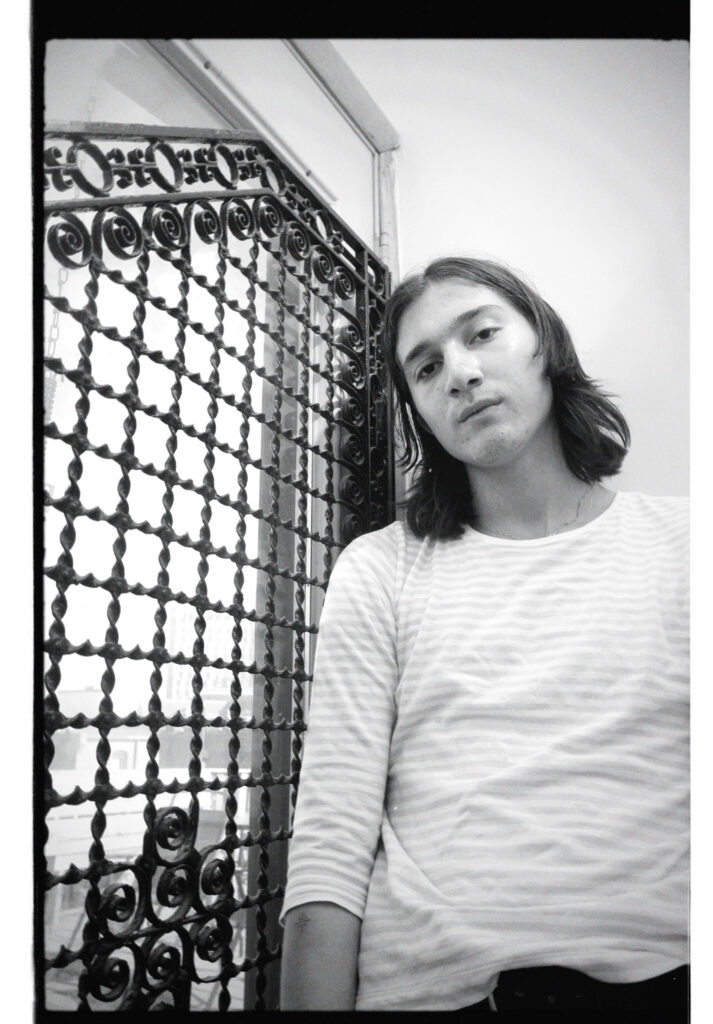
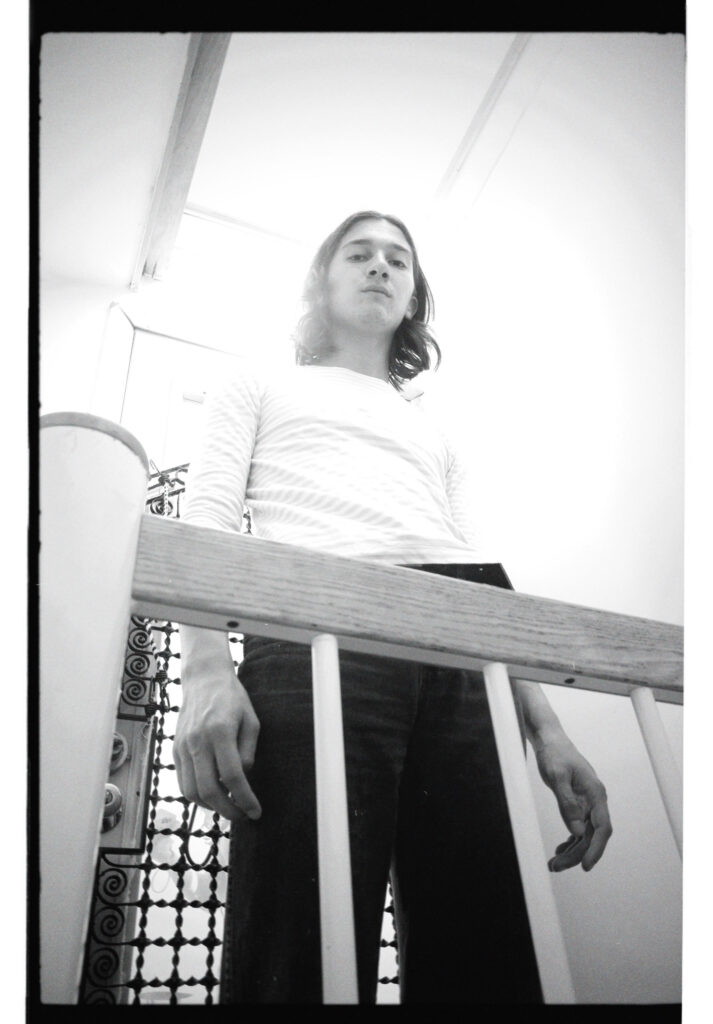
Photos by Ethan Harris
AP: How did you find the Berklee experience?
AC: Pretty cool! There’s a lot of really cool people who go there, really really nice people, too. And the teachers there are like, really crazy. But i also feel like it can get a little impersonal just because there are so many people who go there. So many people have a star complex or something when they go. And it’s crazy cause a lot of the kids who do go there are Internet famous which is so wild to me. But I don’t know, I feel like i never really found a real niche there which is part of the reason why i decided to move to Providence and just continue my studies but in a more personal way where i could do it at home and focus on my own music and whatnot.
AP: When I first saw you you were doing solo shows, but these new shows for the Ecstatic Function release are full band shows.
AC: Yeah I’ve been doing solo shows for two years now. Number Obe Babe started off as a studio concept, like we;d write songs and maybe make an album and nothing was happening for a long time. And then the pandemic happened. But when shows started opening up again it was just me for a long time, which really sucked. I like a solo show but it’s no fun after a while. Part of the reason I like playing out is playing with musicians. So finding a band now who I feel close with and who also really likes the music we’re playing feels like a blessing.
AP: When you play solo, does it change the relationship to the songs?
AC: Yeah it totally does. When I was playing solo I felt like I couldn’t go too far with anything. I feel like you hit a peak somewhere and you’re gonna perform the song the same way after a while. As soon as I organized the band and we all started playing the same songs together, it all changed. It immediately changed. All the songs sound way different with the band which is super cool. We got the idea to maybe record a live album at some point because they’re almost different songs.
AP: When you’re producing these songs, are you considering the moment or time in which they’re going to be heard? Like, these songs are coming out in 2022, but they sound like they could come out in 1968.
AC: I was hoping I could make something that didn’t feel too dated. I was hoping to make a group of songs that you could listen to at any time. I was definitely intentional in choosing what instruments we were going to use and how we were going to present them. I feel like we stayed in a realm where you could listen to these songs and be like, “This could have come out in the sixties or seventies.” I think the coolest thing we’re using on it is a mellotron. I think I was definitely trying to go for something classic, but also just something good. [Laughs] Whether it’s anyone’s cup of tea to listen to, just something that you couldn’t just write off as bad. If you didn’t like the music you could at least say “Well it was recorded nice,” or something. Or “They’re playing well at least.”
AP: The technical ability is really high. Is that something that Berklee drilled into you?
AC: I’ve had a really long time to try and figure out how to make a song. One of the first classes I ever took at Berklee my first semester was a class with the dude who produced Pablo Honey [Sean Slade] and something that he told us was the basis of a pop song and where all these parts should be and for some reason that’s really stuck with me. Like, your chorus should start before the one minute mark, or something. I feel like I really wanted to make a group of songs where nothing was too long and that could just stick. It has sort of a formula.
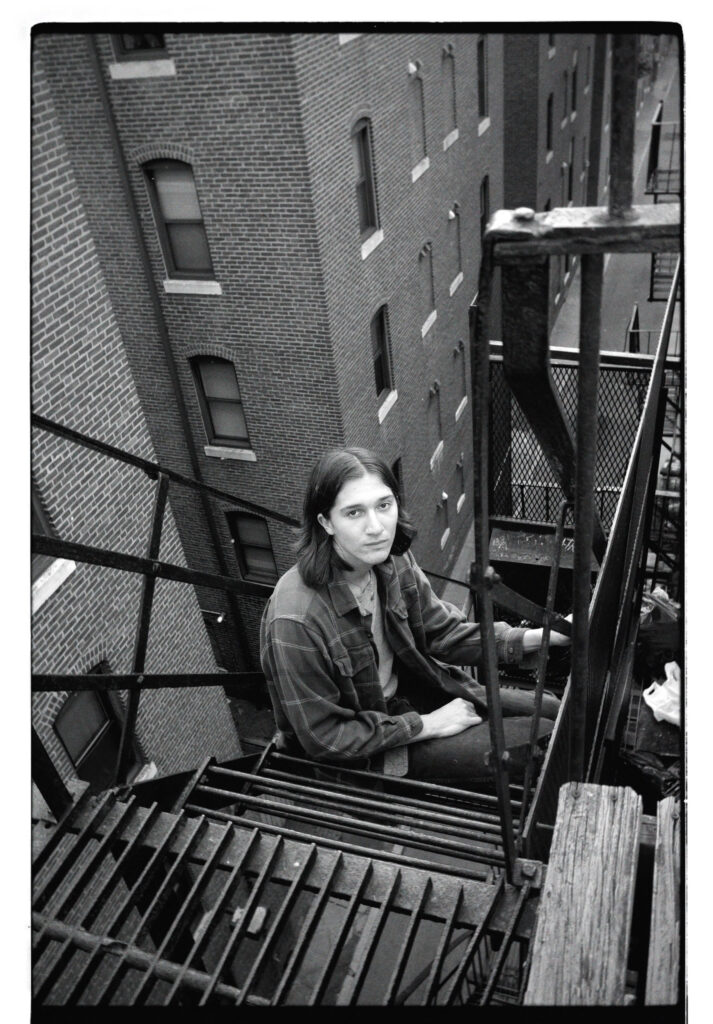
Photo by Ethan Harris
AP: This is your debut album as Number One Babe. Is that part of what you wanted to say with this album?
AC: THe concept of the album has been in my head for a long time but there was a long while where the songs were just not there, I wasn’t writing as much when I first started the project. “Ecstatic Function” the name has been a concept in my head for so long, since 2018 or 2019 and I feel like I needed to name my first album before it was even real. And once the songs started really flowing and I began recording a lot my goal was just to create a group of songs that nobody could be like “Oh this is shit.” I just wanted to do something quality, or at least as quality as I could possibly do inside my room.
AP: I never would have guessed that this was recorded in a house
AC: I’d like to record in a studio, too, but the songs just came out. I think the album finally came because I really started writing a lot more. I had a big pressure on myself to write the best song possible every time I write, which is just not going to happen. Something I’ve realized as I’ve gotten older is that the bad songs fuel the good songs. And it’s “bad,” I don;t think there’s such a thing as bad music at all. Maybe there’s unskilled music, but saying something is bad is giving something no room for growth. When I told myself “just don’t care, just write whatever you can today and then finish it and we’ll move on to the next thing.” And the more I did that the more the really good songs came and the more I was able to finish them. And after a while I thought “I have an album here.” I don’t know if i would have been able to do the whole thing if i didn’t take some pressure off myself and finally realize the best song isn’t going to come every time. It’s just a skill, it;s a muscle to practice. Picking up the guitar or piano is just like going to the gym and it can only get better if you keep doing it.
AP: You’re working in a mode on this album, but there are songs that are just instrumental and there are story songs. How do you know what a song needs to be?
AC: It;s more of a feeling I think and that;s something i was learning as i was writing more and more. In trying to let go of pressure, within that you also have to say “This song is going to be whatever it’s going to be.” There are certain versions of certain tracks that are a bit more complicated or not as complicated and at the end of the day it just didn’t work, you know? In “In Your Hands” before there was a sax solo there was a piano solo that I was so passionate about. I had written it out, notated it. It was such a written solo. And the more I listened to it and mixing it I thought, “This just doesn’t work. It sounds weird.” I wanted to like it because it was the best piano solo I ever played but it just didn’t work. We met a friend of ours who played tenor sax and we thought “Let’s just try it” and it ended up working. Things like that just sometimes work out and you don’t know why and a lot of the time it’s just a feeling.
To me, a song just sounds like it doesn’t need to have words. When I wrote [“Song for Saying Goodbye”] I wanted it to have lyrics. I had friends who I tossed the song around to who said, “Yeah, you could write lyrics for it.” The more I would try the more it would not work. But I had the melody that I ended up working the harmonies around and to me it just worked. It worked as a feeling, and that was OK for me. I just need to listen to what the song needs to be. That’s something I’m still trying to figure out.
Ecstatic Function is available everywhere now. Follow Number One Babe on Instagram.
